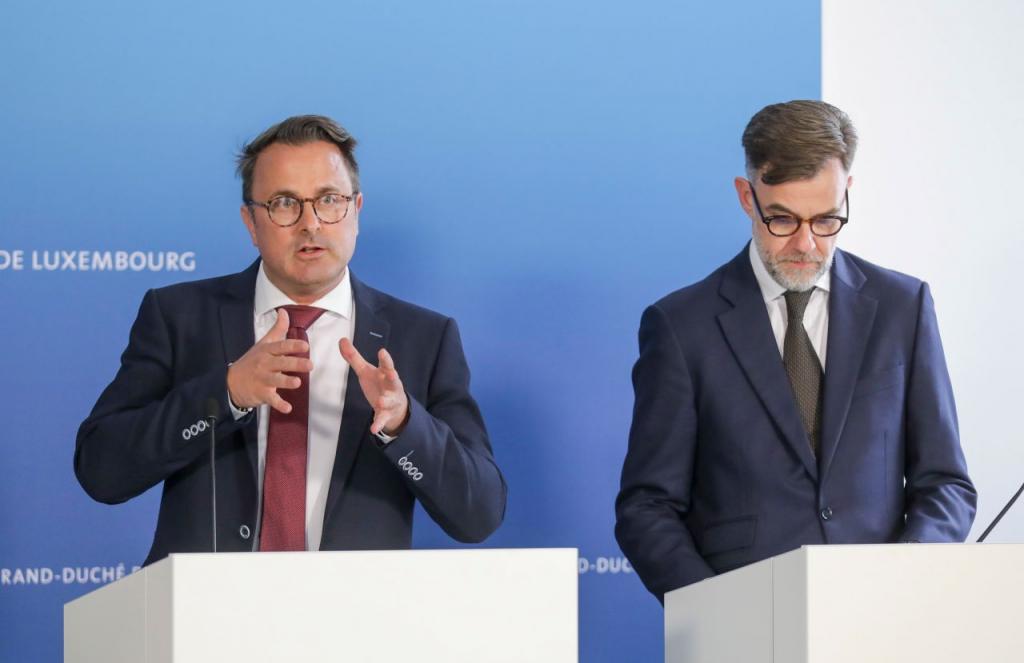Thessaloniki gets ready for its metro launch in November
The underground rapid transit lines have been under construction for almost two decades due to various project delays
 TheMayor.EU logo
TheMayor.EU logo 
L-R: Prime Minister Xavier Bettel, Minister of Economy Franz Fayot, Source: Luc Deflorenne / Luxembourg Government
It aims to increase the share of renewable energy in the country’s mix to around 40% until 2030
On Monday, Luxembourg’s government presented an updated draft version of its National Integrated Energy and Climate Plan – PNEC (Energie- a Klimaplang fir Lëtzebuerg). The plan outlines the country’s climate strategy for reducing emissions and transitioning to more sustainable carbon levels.
The document, however, is just a draft and needs to be approved by the European Commission. At the same time, it already expands the scope of previous targets and measures in its version from 2020. Moreover, apart from more ambitious carbon reduction goals, the ‘Klimaplang’ has 197 individual measures, with a lot of them focusing on providing for a just transition.
According to an official statement by the government, many of Luxembourg’s climate targets are already ambitious and compatible with EU directives, so they will not change. However, there are notable exceptions when it comes to renewable energy and energy efficiency.
The revised targets for 2030 include a 55% reduction in greenhouse gas emissions compared to 2005, to achieve a 35%-37% share of renewables in the energy mix, updated from 25% in the previous plan. Additionally, the country is aiming to improve energy efficiency by 44%, compared to the previous 40%.
The plan has 197 different measures. One highlight is the CO2 tax, which will continue to be increased annually by 5 euros per ton of CO2. It would be primarily aimed at reducing emissions from the sale of road fuels. The proceeds will be used to finance climate measures and solutions, invest in the energy transition and finance social compensation measures.
Another is the continued development of "Klimapakt 2.0", a support scheme for municipalities to strengthen their role in climate action and energy transition. According to a government statement, municipalities are important partners in the implementation of climate objectives at the local level.
Furthermore, the climate plan proposes the creation of a national entity to support energy renovation for residential buildings with low energy performance. The main objective would be to assist owners in increasing efficiency, through insulation and other green measures, suitable for homes.

The underground rapid transit lines have been under construction for almost two decades due to various project delays

Now you can get your wine in Talence by paying directly in Bitcoin

That’s because the state has to spend money on updating the railway infrastructure rather than subsidizing the cost of the popular pass

Rethinking renewable energy sources for the urban landscape

The examples, compiled by Beyond Fossil Fuels, can inform and inspire communities and entrepreneurs that still feel trepidation at the prospect of energy transition

Now you can get your wine in Talence by paying directly in Bitcoin

The 10th European Conference on Sustainable Cities and Towns (ESCT) sets the stage for stronger cooperation between the EU, national and local level to fast track Europe's transition to climate neutrality.

At least, that’s the promise made by the mayor of Paris, Anne Hidalgo

The underground rapid transit lines have been under construction for almost two decades due to various project delays

At least, that’s the promise made by the mayor of Paris, Anne Hidalgo

Hostal de Pinós is located in the geographical centre of the autonomous region

Despite its church-y name, the district has long been known as the hangout spot for the artsy crowds

Urban dwellers across the EU are having a say in making their surroundings friendlier to people and the environment.

Forests in the EU can help green the European construction industry and bolster a continent-wide push for architectural improvements.

Apply by 10 November and do your part for the transformation of European public spaces

An interview with the Mayor of a Polish city that seeks to reinvent itself

An interview with the newly elected ICLEI President and Mayor of Malmö

A conversation with the Mayor of Lisbon about the spirit and dimensions of innovation present in the Portuguese capital














